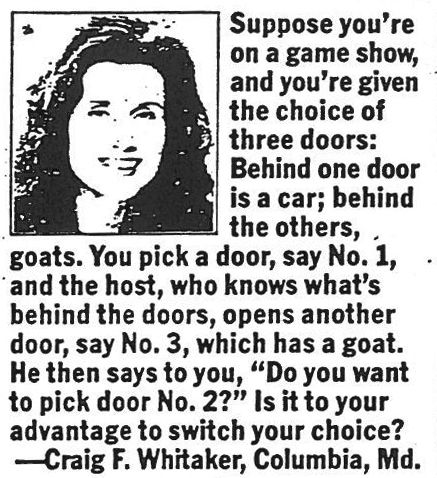When I first learned of the Monty Hall problem in an undergrad Discrete class, I wrote a program to simulate it. It was pretty easy to see it's statistically correct, at least. You'd think those PhDs would have at least tried it a few times, to see if it appeared correct in practice, before writing a signed letter to a magazine. Kinda surprises me. My app was 50 (non-boilerplate) lines of Java. If you can't write an app to demonstrate 3 simple logic rules, which a university sophomore can (did) in an hour, I uh, hope you don't make a career out of it.But many people tried performing similar experiments on computers, fearlessly programming them in hundreds of different ways. Not surprisingly, they fared a little less well.
There are two necessary assumptions in the problem that one might overlook when programming a simulator. It is critical that (1) the host knows where the prize is and (2) never opens that door. The original language didn't make the second assumption absolutely clear. So the simulator might make everything random and simply ignore cases in which the door with the prize is opened by the host, giving the player the choice of two wrong doors. If the host knows where the prize is, but still opens one door at random, and it happens to reveal a goat, the remaining doors each have a 50% chance of hiding the car. But I agree that hubris among PhDs was a contributing factor. I got suckered into the wrong answer too, and the standard tactic of going to extremes with a million doors helped me see the light.
Yeah, her article glosses over that. I also didn't mean to be condescending to hobbyists. She doesn't say how many of her programmer writers were professionals versus amateurs. Nothing wrong with doing it wrong if you're learning to code. That's how you learn. I should mention, I learned about it in Discrete Math in the context of how foreknowledge affects results. So I knew what made the difference going in; it was just a matter of grasping why.(2) never opens that door. The original language didn't make the second assumption absolutely clear.
(2) never opens that door.